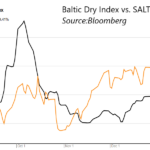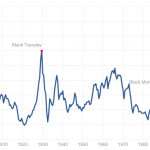An Elephant Hunter Explains Inflection Point Investing
John Petersen In "An Elephant Hunter Explains Market Dynamics" I discussed the two basic types of public companies; earnings-driven companies that are “bought” in top-tier weighing machine markets and event-driven companies that are “sold” in lower-tier voting machine markets. Today I'll get a bit more granular and show how "sold" companies usually fall into one of two discrete sub-classes that have a major impact on their stock market valuations. As a starting point, I'll ignore the China-based companies that are listed in the US because their quirky metrics would only confuse the analysis. Then I'll break...
Calling for a Marshall Plan, not a Manhattan Project
Electricity too cheap to meter. For many renewable energy advocates, that is the holy grail… new technology which will not only solve the problem of carbon emissions, but be so transformative that we no longer have to worry about turning off the lights when we leave the room. We could argue for days about the viability of any such technology, be it cold fusion, hydrogen, or photovoltaic nanodots. I personally have strong opinions about the likelihood of any technology to produce energy so cheaply that it would not make sense to use some mechanism...
The Catholic Church Shouldn’t be Investing in Abortion Clinics
Tom Konrad CFA Jesus Saves, but where does he invest? Photo via Bigstock. This article is not about the Church, or abortion. As far as I know, the former does not invest in the latter. This article is about investing, and morality. Since 350.org began its campaign to get endowments and pensions to divest from fossil fuels, I've heard two basic criticisms of the movement from my colleagues in the investment management profession. Endowments selling their fossil fuel investments won't stop us from using fossil...
Money Managers See Value in Clean Energy Sector, but Hesitate to Call the Bottom
Tom Konrad CFA Three green stock specialists see individual stocks at attractive values, but think it's too soon to call the bottom for the sector as a whole. Last month, I wrote that I'm again finding clean energy stocks that I think are bargains, and listed ten. I was not ready to call a bottom for clean energy, and in fact said I expected the market to get worse before it gets better, so investors should keep some money on the sidelines to wait for more opportunities to emerge. In a little over a month...
Beating the Market, Part I
Because I'm currently studying for the second (of three) CFA® exam, I'm going to take a break from my usual article analyzing some aspect of alternative energy. This week and next, I'll take a step back and try to answer an existential question: How can I possibly hope to beat the market, when "the market" consists of professional money managers with resources far exceeding my own? Every active investor should ask themselves this question: the answer will either make you a better investor, or save you a lot of time and money if you are humble enough to realize...
UltraPromises Fall Short
When I first came across ProShares' UltraShort ETFs, I thought they were a brilliant idea. They seem to promise a multitude of advantages for investors: The ability to hedge market or sector exposure without having to go short. (Going short requires a margin account, and US law prohibits the use of margin in most retirement accounts.) They should have a better risk profile than shorting. With an UltraShort, you can't lose more than your initial investment. With true shorting, the potential losses are unlimited. As the underlying index rises, each percentage gain creates a smaller dollar fall, while...
Free Talk: A Permaculture Portfolio
For readers in the Hudson Valley, I will be giving a free talk next Monday night. I will speak about applying permaculture design principles to your investment strategy. While I developed my own strategy over the last two decades without any reference to these design principles, now that I'm familiar with them, I realize that I have been thinking along these lines for a long time. The design principles are remarkably robust and intuitive.
I used to think Permaculture was just about redesigning our food systems, but it's much much more than that.
The talk is sponsored by the Rondout Valley...
Preparing for Catastrophe: Is your global warming portfolio ready for rising sea levels?
A Worse-Case Scenario I believe that a large part of global warming denial is fear: fear that if we acknowledge that global warming is happening, we will be morally obligated to do something about it, and that the problem is too large for us to do anything effective. I also believe that denying the problem is certain to render us all ineffective in dealing with it. But getting over our global warming denial is not the only obstacle in our way to dealing with it. Global warming is already happening, and future temperature rises are already inevitable given the...
Green Energy Investing for Experts, Index and Wrap-Up
Tom Konrad, CFA My Green Energy Investing for Experts series looked at ways shorting could both protect your portfolio against market decline, and make it greener by shorting decidedly non-green companies. This is an index of the entries, plus one more industry for you to consider. Green Energy Investing for Experts, Part I made the case that shorting stocks that are particularly vulnerable to peak oil or climate change is a good way to hedge a portfolio of green stocks against a market decline while making the whole portfolio greener. Green Energy Investing for Experts, Part II looked at...
SALT: Buying the Balitc Dry Dips
by Tom Konrad, Ph.D. CFA
The Baltic Dry Index (BDI) is a shipping and trade index created by the London-based Baltic Exchange. It measures changes in the cost of transporting various raw materials, such as coal and steel.
Since the BDI is a measure of the income which firms that own dry bulk cargo ships can earn, changes in the BDI tend to drive changes in the stock prices of such companies.
Stock Price Correlation
Until recently, one such company was Scorpio Bulkers (SALT), one of my Ten Clean Energy Stocks for 2021 picks. The chart below shows the last 5 years, with...
How to Beat the Market: Less Money and More Judgement
Last week, I looked at how a small investor could gain an advantage in the market by understanding the other players. The most important other players are institutional investors such as hedge funds, pension funds, mutual funds, and investment banks who have considerably more resources and valuation skills than the individual investor, and so trying to take them on directly to beat them at their own is likely to be an expensive exercise in futility. Two Exploitable Weaknesses On the other hand, I argued that institutional investors have certain handicaps and biases which do allow small investors to enter...
Navigating the Clean and Bloody Streets of Europe
Tom Konrad CFA Blood In the Streets Walter Rothschild, 2nd Baron Rothschild Image via Wikipedia Baron Rothschild was an 18th century British nobleman who supposedly originated the phrase "Buy when there's blood in the streets, even if the blood is your own." Although accounts differ, Rothschild was a successful banker, and supposedly made a fortune buying in the panic that followed the Battle of Waterloo against Napoleon. True or not, the...
Green Energy Investing For Beginners: How Many Stocks Should You Own?
Tom Konrad, CFA In stock portfolios, deciding how many stocks to own involves weighing a trade off. A smaller portfolio can be built (and sold) with fewer commissions, and also requires less time to research. On the other hand, a portfolio with fewer stocks will gain fewer benefits of diversification, and likely be both more volatile and harder to sell in a crisis. These trade offs are also affected by the size of the portfolio, and the market capitalization and liquidity of the companies in the portfolio. Diversification is widely accepted as a nearly costless way to reduce...
The Problem With Proxy Ballots
Vote With Money Instead by Garvin Jabusch Many people assume that engagement with public companies through proxy voting and resolution filing is the best if not only way to see positive environmental, social, and governance outcomes from your investments. For me, this approach misses a fundamental point of market-based solutions: you make in investments in the most compelling ideas that reflect what you think is likely to grow, where you think the economy is headed, and yes, outcomes you support. That means using investments to favor firms that are already making innovative sustainable contributions to the global economy...
Correction, or Bear Market?
by Tom Konrad, Ph.D., CFA
On February 21st, I was helping an investment advisor I consult with pick stocks for a new client's portfolio. He lamented that there were not enough stocks at good valuations. This is one of the hardest parts of being an investment advisor: a client expects the advisor to build a portfolio of stocks which should do well, but sometimes, especially in late stage bull markets, most stocks are overvalued. I reminded him, "The Constitution does not guarantee anyone the right to good stock picks." He agreed, but he still had to tell his client that...
Permaculture Design and Stock Market Investing
by Tom Konrad Ph.D., CFA
Passive Investing And Modern Agriculture: Parallels
Today's stock market is a dynamic and scary place.
Once choosing stocks to invest in based on the fundamental value of the companies they represent (called fundamental or value investing) was the dominant paradigm for investors. No longer. In 2017, JP Morgan estimated that only 10 percent of trading came from fundamental investors. The vast majority of trading now comes from computer based algorithmic trading, and passive investors following pre-defined rules, such as index investors. According to Morningstar, nearly 45 percent of all stocks are owned by passive investors. These should...






